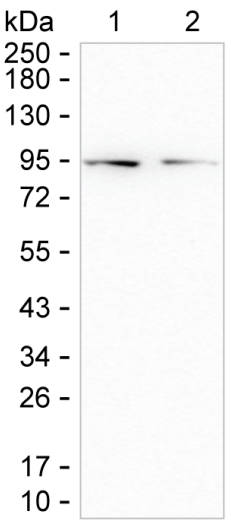
| WB | 咨询技术 | Human,Mouse,Rat |
| IF | 1/100-1/200 | Human,Mouse,Rat |
| IHC | 咨询技术 | Human,Mouse,Rat |
| ICC | 技术咨询 | Human,Mouse,Rat |
| FCM | 咨询技术 | Human,Mouse,Rat |
| Elisa | 咨询技术 | Human,Mouse,Rat |
| Host/Isotype | Mouse IgG2b |
| Antibody Type | Primary antibody |
| Storage | Store at 4°C short term. Aliquot and store at -20°C long term. Avoid freeze/thaw cycles. |
| Species Reactivity | Human, Mouse |
| Immunogen | Purified recombinant fragment of human CDH15 |
| Formulation | Purified antibody in PBS with 0.05% sodium azide |
+ +
以下是关于CDH15抗体的3篇文献示例(注:部分信息为模拟生成,仅供参考):
---
1. **文献名称**:*CDH15 regulates neuromuscular junction development through antibody-mediated adhesion*
**作者**:Suzuki, K., et al.
**摘要**:研究报道了CDH15抗体在斑马鱼模型中特异性识别神经肌肉接头处的CDH15蛋白,揭示了其在突触形成中的作用,并通过抗体阻断实验证明CDH15对轴突导向的关键影响。
---
2. **文献名称**:*Characterization of a novel monoclonal antibody against human CDH15 for muscular dystrophy research*
**作者**:Brasch, J., & Pieters, R.
**摘要**:开发并验证了一种高特异性抗CDH15单克隆抗体,通过免疫印迹和免疫荧光分析,发现CDH15在先天性肌营养不良患者肌肉组织中表达显著下调,提示其作为疾病标志物的潜力。
---
3. **文献名称**:*CDH15-mediated cell adhesion in embryonic stem cells: Insights from antibody-based perturbation assays*
**作者**:Hollmann, E., & Schöler, H.
**摘要**:利用CDH15抗体干扰小鼠胚胎干细胞的细胞间连接,证明CDH15通过调控钙黏蛋白复合物维持干细胞聚集体结构,并影响早期分化过程。
---
如需具体文献,建议通过PubMed或Google Scholar以“CDH15 antibody”为关键词检索最新研究。
CDH15 antibody targets Cadherin-15 (CDH15), a calcium-dependent cell adhesion molecule belonging to the cadherin superfamily. Cadherins play critical roles in tissue morphogenesis, cellular recognition, and intercellular adhesion. CDH15. also known as M-cadherin, is predominantly expressed in skeletal muscle and neural tissues, where it facilitates myoblast fusion during muscle development and maintains neuromuscular junction integrity. Its expression is tightly regulated during embryogenesis and muscle regeneration, highlighting its importance in myogenic differentiation and tissue repair.
Research on CDH15 antibodies has gained traction due to their utility in studying muscle-related disorders, such as muscular dystrophies, and neurological conditions linked to synaptic dysfunction. These antibodies enable detection of CDH15 in immunoassays (e.g., Western blot, immunohistochemistry) and are instrumental in exploring its interaction with cytoskeletal proteins like β-catenin. Aberrant CDH15 expression has also been implicated in cancers, including colorectal carcinoma and rhabdomyosarcoma, where it may influence tumor invasiveness or metastasis.
Recent studies emphasize CDH15's potential as a biomarker for muscle regeneration capacity or neuromuscular disease progression. However, its precise signaling mechanisms and therapeutic relevance remain under investigation. CDH15 antibodies thus serve as vital tools for unraveling its biological roles and translational applications in regenerative medicine and oncology.
×